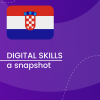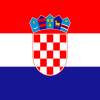Croatia - Digital Croatia Strategy for the period until 2032
The Digital Croatia Strategy for the period until 2032 was adopted by the national Parliament in December 2022. Aim of the Strategy is to digitalise the Croatian society, public administration, and the economy in the period until 2032.
Based on the objectives and targets of the Europe’s digital decade, the strategy sets the frame for national, EU and private investments in the digital transition in Croatia and defines strategic objectives in the digital transition of the economy, the digitalisation of the public administration and justice, the digital connectivity, and the development of digital skills and jobs.
Strategic objectives are set in 4 priority areas:
- Developed and innovative digital economy.
- Digitalised public administration.
- Very high capacity networks (VHCN) deployed, available, and taken up.
- Developed digital competences for working and living in a digital age.
The main obstacle to realising the digitalisation potential is the lack of compliance of workforce skills with labour market needs, not only in terms of the number of ICT specialists, but also digital skills of the workforce outside the ICT sector. Other key weaknesses of Croatia in the area of digital competences and digital workplaces that need addressing entail the lack of primary and secondary school teachers in STEM areas (primarily maths, physics, and informatics) who leave the education system on account of low salaries. Shortage of ICT specialists on the labour market considering the needs and potential growth of companies also constitutes a major weakness. Furthermore, the analysis has shown that not enough of Croatian citizens participate in lifelong learning to acquire digital competences.
Priority areas of the digital competencies development:
- Increasing the number of ICT specialists on the labour market.
- Developing citizens’ digital competences for working and living in a digital age, with the help of ICT.
- Digital transition supporting the development of the education and research system.
Croatia aims to become a country with digitally and economically competitive enterprises and digitalised public administration by creating a regulatory, investment, and tax environment that fosters technological development and innovation, investing in citizens’ digital competences, and increasing the number of ICT specialists in the private and public sector.
Strategy Details
The financial framework for implementing this Strategy is included in the:
- State budget of Croatia, all sources of funding combined in the state budget and budgets that are part of the general government budget.
- Multiannual Financial Framework (MFF) of the European Union (for the 2014-2020 period, implementation by 2023, as well as the 2021-2027 period) including:
- programs funded by: European Regional Development Fund (ERDF), European Social Fund Plus (ESF+), Just Transition Fund (JTF) and European Maritime, Fisheries and Aquaculture Fund (EMFAF) (areas defined in the Operational Programme Competitiveness and Cohesion (2021- 2027) (OPCC) and Operational Programme Efficient Human Resources (2021-2027);
- Recovery and Resilience Facility (areas defined in the National Recovery and Resilience Plan (NRRP) 2021-2026).
Responsible for the Strategy’s preparation and implementation is the Central State Office for the Development of the Digital Society in cooperation with the main stakeholders: competent public authorities, representatives of business associations and social partners, academic and science community, civil society organisations and interested public, who participated in the work of the expert working group and subgroups. More than 40 organisations were involved in the preparation of the Strategy.





